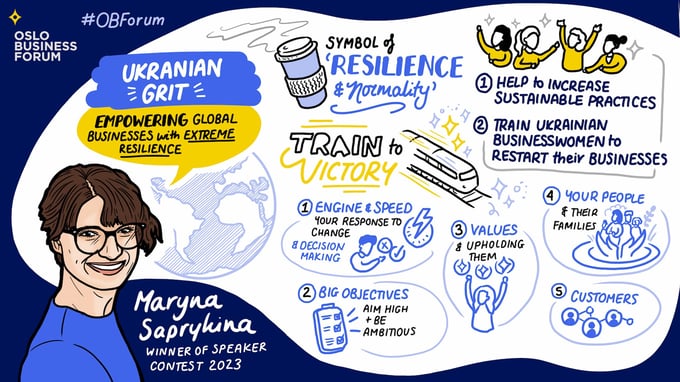Maryna Saprykina demonstrated how companies in Ukraine have harnessed resilience to survive and thrive against the backdrop of the most significant European conflict since WWII. She stands as a beacon of hope and a testament to the indomitable spirit of Ukrainian businesses.
Maryna has witnessed firsthand how Ukrainian businesses are thriving in chaos. When Russia threatened her home in Kyiv, she came back to the city with two objectives:
1. To help Ukrainian businesses increase sustainable practices.
2. To help Ukrainian women start or restart their businesses.
Maryna herself is a symbol of strength and resilience in a time of darkness. She began her pursuit of these big objectives without resources or people to support her. Now, more than a year later, she has 12 people on her staff, and they have trained more than 500 Ukrainian women. Her aim is to grow that number to one million.
What Maryna has witnessed and what her company has helped achieve is evident in these statistics: in 2022, more people became individual entrepreneurs in Ukraine than before the war, and every second business in Ukraine was registered by a woman.
The businesses not just beginning but thriving in wartime are evidence of true Ukrainian grit and resilience. Maryna challenged leaders at Oslo Business Forum to question their own resilience and learn to thrive in chaos using lessons from Ukrainian businesses.
.jpg?width=680&height=454&name=IMG_6084%20(1).jpg)
Maryna Saprykina is the CEO of CSR Ukraine, Founder of the Ukrainian Women Entrepreneurs Hub, and winner of Speaker Contest 2023. As a passionate sustainability consultant from Ukraine, she has spent more than 15 years fostering socially responsible businesses in a landscape fraught with uncertainties.
A Ride on the Resilience Train
As tensions emerge between superpowers and disruption shakes the world in ways we can’t predict, Maryna is adamant that resilience is the most important characteristic leaders need now. She unraveled wartime sustainability strategies that have fueled Ukrainian business tenacity and powered remarkable transformation.
“Resilience is the characteristic we need now.”
Maryna built a resilience train, connecting five “wagons” that symbolize the components of a strong resilience strategy.
Wagon #1: Speed
Businesses can evaluate their resilience based on how quickly they are able to respond to external shocks. How quick is your decision-making? Measure your speed by assessing how your teams make decisions.
Wagon #2: Big Objective
Businesses can build their resilience by setting a big objective that guides their actions and aligns their people. For Ukrainian businesses, the big objective is to contribute to their country’s victory. For other businesses, the big objective may center on environmental or social issues that matter to their employees and customers.
Wagon #3: Values
A business’ resilience can be judged by how far it is willing to go to uphold its values. In Ukraine, the war became a litmus test of values for many companies, and Maryna witnessed a big discrepancy in some. Those who made the decision to stop cooperating with Russia risked their profits but upheld their values of courage, determination, and unwavering commitment in the face of adversity.
Wagon #4: Your People
Businesses can build their resilience by taking care of their people. One billion people experience mental health issues, and each year, mental health costs the global economy 1 trillion dollars. Ukrainian companies have responded by establishing departments, conducting workshops, and enabling managers to cope with stress and pass their knowledge on to employees.
Wagon #5: Your Customers
Building resilience also requires taking care of your customers. Businesses in Ukraine experienced many challenges after Russia’s invasion. Such dramatic shocks to operations would signal the end of almost any company. In Ukraine, businesses demonstrated resilience by following their customers as they relocated, delivering the same level of service they had experienced at home.
“Follow your customers, even in bad times.”
Together, these components construct the track to resilience, innovation, and competitiveness. But Maryna reminded leaders that there is one more thing they need to make the train move: personal resilience.

Personal Resilience
Maryna believes strongly that organizational resilience cannot be achieved without individual resilience. A company’s leaders must rely on their own grit to create change in challenging times.
She painted a picture of organizational and individual resilience by sharing the story of a Ukrainian wine distributor. This distributor lost 15 million euros when their warehouse was destroyed in the war. Just two percent of the 1.6 million bottles of wine they housed remained—and they sold these bottles under the title “Wine that Survived.”
Maryna urged leaders at Oslo Business Forum to use these lessons from Ukraine to develop a resilience strategy that will withstand disruption and empower them to thrive in chaos.
Key Points
- A successful resilience strategy has five key components: speed, a big objective, values, people, and customers.
- Businesses can evaluate their resilience based on how quickly they are able to respond to external shocks.
- Businesses can build their resilience by setting a big objective that guides their actions and aligns their people.
- A business’ resilience can be judged by how far it is willing to go to uphold its values.
- The most resilient businesses care for their people and follow their customers.
- A company’s leaders must also rely on their own grit to create change in challenging times.
Questions to Consider
- Is your company equipped to make decisions with speed and ease, even under duress?
- What is your big objective? Is everyone in the business aware and on board?
- In your experience as a leader, when have your values been challenged? How did you respond?
- Can you improve your company’s resilience by taking better care of your employees and customers?
- Assess your personal resilience. Do you have the grit required to create change in challenging times?
Want to be a part of the OBF community? Join Oslo Business Forum 2024: Courageous Leadership now!
